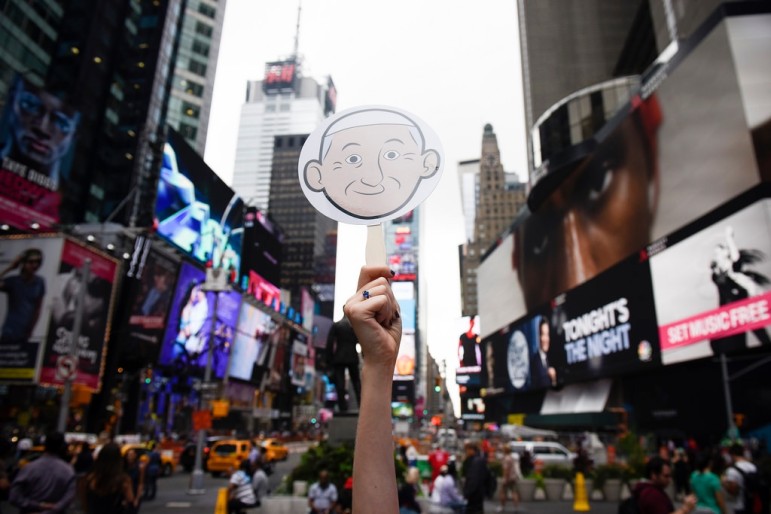
September 19, 2015; Wall Street Journal
Everyone seems to have some expectations of Pope Francis on his visit to Washington, New York City, and Philadelphia. When he is referred to as the “People’s Pope,” it isn’t just Catholics who look to him for leadership. People of many countries and religions have an expectation that the Argentinian-born pope will speak to their interests and concerns. Given the latest verbal meanderings of at least two Republican presidential candidates—Donald Trump and Ben Carson—who by omission and commission articulated ideas that might be considered anti-Muslim, the Pope may well raise issues that concern Americans about relationships with the Muslim world.
One is the issue of Palestine, which has some special significance this week. Earlier this month, the United Nations General Assembly voted to allow non-member states’ flags to be flown outside the UN headquarters in New York, including the Palestinian flag. The other non-member observer state now allowed to raise its flag is the Vatican. Although initially reluctant, the Vatican has agreed to have its flag hoisted along with the Palestinian flag in time for the Pope’s UN speech on September 25th and Mahmoud Abbas’s on September 30th. The vote on the non-member states’ flag was approved overwhelmingly, with only eight governments voting against, notably including the United States and Israel.
The Pope has spoken in support of recognizing Palestine and of a two-state solution. The Wall Street Journal’s Vatican correspondent, Francis X. Rocca, was asked whether Pope Francis was likely to raise the issue of Palestine with President Obama during their upcoming meeting. Rocca explained, “The widely published image of Francis praying at the separation wall on the West Bank last year certainly brought that message to millions who had never suspected it. No doubt the Israel-Palestine question will be touched on during his White House visit, if not by the pope then by his secretary of state, Cardinal Parolin, who will be meeting with John Kerry.”
Sign up for our free newsletters
Subscribe to NPQ's newsletters to have our top stories delivered directly to your inbox.
By signing up, you agree to our privacy policy and terms of use, and to receive messages from NPQ and our partners.
The policy difference with the U.S. isn’t just a question of a possible two-state solution. This past spring, the Vatican officially recognized Palestine as a nation, as opposed to simply maintaining diplomatic relations with the Palestinian Liberation Organization. That made the Vatican the 135th nation to recognize Palestine as an independent country.
During the Pope’s visit, he will stop in at the Washington offices of Catholic Charities. The strongly pro-Israel, anti-Palestinian research organization, NGO Monitor, last summer published a critique that alleged that “Catholic aid societies” participate in and fund organizations that support the Boycott Divestment Sanctions (BDS) movement. The report indicated most of the prominent Catholic organizations funding or backing BDS supporters were associated with Caritas Internationalis, including in the U.S. Catholic Relief Services. This year, several international Catholic charities called for the end of the Israeli blockade of Gaza. Because of the way the report was discussed in the press, it would be easy for readers to think that the NGO Monitor study was about Catholic Charities, specifically Catholic Charities USA, dedicated to anti-poverty work in the U.S.
The Pope may find himself raising the issue of Palestinian independence with his reluctant U.S. government hosts, defending Catholic Charities USA from accusations that it is a clandestine supporter of the BDS movement, and perhaps advocating for charitable concern for Palestinians. According to Adelphi University professor Reem Khamis-Dakwar, the Pope is likely to be asked to help raise money for 47 schools run by the Catholic Church or other Christian denominations to educate Palestinians within Israel. Dr. Khamis-Dakwar says that these schools have suffered crippling cuts in funding from Israeli authorities—perhaps, she suggests, as retribution against the Vatican’s recognition of Palestine.
During his visit, Pope Francis will be carrying hopes and expectations of people from around the world, Catholics, Jews, and Muslims, and both Israelis and Palestinians (the Pope has strongly called for Palestinians to recognize Israel). The Pope probably won’t carry any baggage from Ben Carson who doesn’t believe a Muslim should ever become president of the U.S. or Donald Trump who entertained and failed to challenge a question about how to “get rid” of Muslims in the U.S. and whether President Obama was really a secret Muslim.—Rick Cohen













